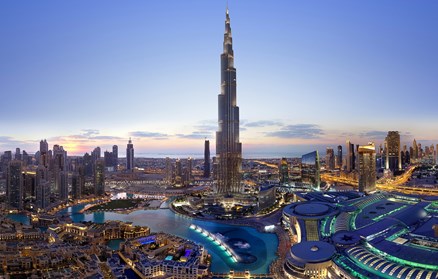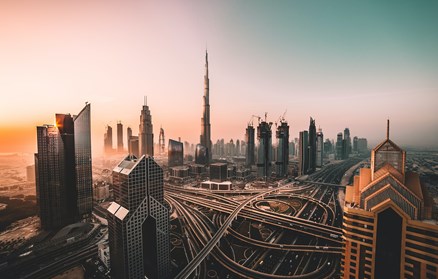- ABOUT
- BUSINESS SECTORS
- COMMUNITY
- COMPANY PORTFOLIO
- COSTS & FEES
- FACILITIES
- LICENSE TYPES
- LOCATION
- REGISTER YOUR INTEREST
Business Sectors
Logistics
The logistics sector, representing 14 percent of Dubai’s GDP, is seen as a strategically important goal for the sustained, long-term success of the national economy. The logistics industry in the UAE is undergoing a massive transformation, and the diversification plans, harmonisation of regional trade, and the evolving export regulations have led to the modernisation of the national industry, more so in Dubai. The emirate is a major trans-shipment point for the UAE logistics market and a multi-modal logistics hub to cater to the demand of growing international trade.
Playing an important role in this growth, Dubai South’s Logistics District is not only strengthening the logistics sector of the country but is also facilitating the government’s mandate to build capability, knowledge, and practical solutions for different industries, with the overall strategic objective of positioning Dubai and the UAE as leading economic players on the global stage. This includes knowledge-based, sustainable, and innovation-focused businesses under the Dubai Industrial Strategy 2030 and UAE Vision 2021 to position the nation at the forefront of the world by its golden jubilee in 2021.
E-commerce
The growth of e-commerce and the ever-evolving consumer behaviour have altered the course of global retail. Purchasing goods electronically has become a major trend, forcing retailers to remodel their businesses to maintain competitiveness and efficiency. The Middle East is continuing to experience monumental growth in e-commerce, with an estimated market value of $28.5 billion by 2022 that is expected to increase fourfold over the coming years.
As the future of trade in the UAE is focused on digitalisation, in line with the nation’s drive towards creating smart cities, the growth of e-commerce is very much part of this. Cashless payments and e-commerce are top government priorities as outlined in UAE Vision 2021. The UAE’s pivotal position on the global trade map, its large storage capacity, and its extensive logistical networks, coupled with government support, contributed to the growth of the sector. The e-commerce market has gained momentum in the UAE, with customers today able to get their hands on a vast range of consumer goods and services, all via a tap, click or swipe on their mobile devices or computers. The increasing number of digitally perceptive UAE consumers are consistently seeking on-demand, near-instant solutions.
The establishment of EZDubai, a fully dedicated e-commerce zone located at the heart of the Logistics District in Dubai South has bridged the gap in e-commerce, not only in Dubai but in the GCC as a whole. The ultra-modern infrastructure, regulatory framework, connectivity and ease in logistics are phenomena that will position the UAE as the epitome of the global e-commerce industry. E-commerce is set to contribute AED 12 billion to the local GDP by 2023 and having a fully-fledged operational facility like EZDubai demonstrates the ability of the region to manage and facilitate this growth. With seamless, multi-modal connectivity between road, air and sea transportation, the Logistics District has streamlined customs processes with an on-site licensing and visa authority. Additionally, the zone provided optimal solutions and unparalleled access to cross-continental distribution networks, extending its reach to the high-growth markets of the Middle East, Africa and South Asia (MEASA) region.
Trade
Dubai is a global trade corridor to international markets that has firmly established itself as a global leader in innovation. As a hyper-connected, pro-business hub between the east and the west, linking growth markets across the Middle East, Africa, India, Asia Pacific, and China to the rest of the world, the emirate is served by over 120 shipping lines and linked via 85 airlines to over 130 global destinations. It offers investors a unique and comprehensive, value-added platform with its strategic location and consistently strong economic outlook. Its effective logistical and operational costs, excellent infrastructure, and flexible policies are attracting investors from across the region. Dubai’s policy of investing heavily in transport, telecommunications, energy, and industrial infrastructure has enabled it to have one of the best infrastructure facilities in the world.
The emirate features a network of several industrial areas, highly successful business parks, specialised free zones of international distinction, two world-class seaports, a major international airport and cargo village, a modern highway network, state-of-the-art telecommunications, and reliable power and utilities, all of which deliver efficiency, flexibility, and reliability at a reasonable cost and size. One of the main contributors to the aforementioned is Dubai South which encapsulates main pillars that facilitate this growth sector, namely the Logistics District and the Aviation Hub. Both play a role in seamless connectivity and present a complete economic platform for every kind of business and industry to flourish, prosper, and sustain itself. Dubai South’s proximity to the seaport of Jebel Ali and being home to Al Maktoum International Airport also makes it a convenient international hub with an entire ecosystem supply chain catering to the seamless movement of goods and services by land, air and sea.
Aviation
The UAE government noted the utmost importance of Aviation to the country’s overall future sustainable development, constructing international airports, establishing leading international aviation companies, and investing billions in infrastructure. The country has advanced transport and telecommunication networks, making it a link between the east and west as well as an international hub for tourism, business, transit and re-exporting, enabling its modern aviation sector to succeed in today’s competitive world. Dubai’s strategic location grants easy access to billions of different segments, including VIP travelers, tourists, and consumers through an extensive aviation network. Home to over 100 airlines, Dubai is connected to more than 250 destinations globally, and the UAE’s aviation sector is projected to reach AED 323.6 billion ($88.1 billion) by 2030, according to the Airport Council International.
It is worth noting that the aviation sector represents over one-quarter of Dubai’s GDP, with Dubai South’s Mohammed Bin Rashid Aerospace Hub, the region’s first aerotropolis, contributing to the growth of the sector. MBRAH is home to an infrastructure that is dedicated to a diverse aviation ecosystem, accommodating commercial, freight, business jets, and aircraft maintenance operations as well as customer-centric, business-friendly solutions for companies, while also offering 100 percent free-zone benefits and services. Additionally, the free zone within the hub aims to be home to start-ups and SMEs from all over the world and across industries. MBRAH laid down the foundation for international companies and regional players and is currently the hub for big players like Boeing, Lufthansa Technik and General Electric as well as for Dynamic Advanced Training where cabin crew members are trained.
Real Estate
Dubai — asides from being one of the safest, most proactive cities to visit, live and work in — is an ideal hub for business, tourism and innovation. It offers investors and tenants a diverse set of benefits to take advantage of and its market is boosted with improved affordability following price falls, and relaxed foreign business ownership regulations as well as the UAE Central Bank’s removal of the 20% cap on bank real estate lending, increased economic activity due to Expo, and relaxed visa rules, among others.
On another note, Expo will, of course, drive forward the vision of Dubai. It is not merely the preparations and the happening of the event itself, which, now with the postponement, is building even more excitement and success, but the event represents a gateway to the world, putting Dubai on the world stage and forming business relationships.
Speaking of which, Dubai South real estate hub is a major contributor to Dubai’s real estate market and holds the potential to shape its prospects in more ways than one. Dubai South’s designated a real estate hub that entails a residential district as well as a retail and business park to create a vibrant living environment, which is being dubbed as the emirate’s first urban lifestyle project that is fully committed to supporting economic expansion and divergence plans.
The Residential District, on the other hand, reimagines urban spaces by offering a world-class community based on the happiness and well-being of people, in line with Dubai South’s commitment to developing quality, affordable residences. It is distinguished by its distinct design, superior build quality, and wide range of lifestyle amenities in proximity to the Expo 2020 site and Al Maktoum International Airport.
Moreover, the Business Park offers commercial tenants free-zone incentives that include total foreign ownership, catering to various key sectors that substantially contribute to consolidating the emirate’s economy. With state-of-the-art office space in a business park environment, commercial tenants would enjoy dedicated resources to assist with setting up a business licences and facilitating visa processing to ensure companies have the comfort and confidence of moving in with ease.







